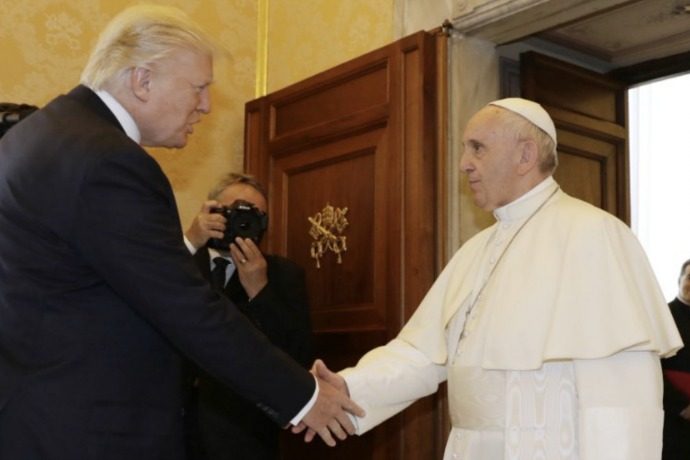There’s a danger for any institution that allies itself too closely with any given political party, a hazard that’s pronounced in the age of Trump, as the raw racial animus at his core becomes impossible to ignore for even those who were determined to avert their gaze.
But that danger is especially acute for religious institutions, which face a special moral hazard in becoming too closely identified with a specific party. And, as political scientist Timothy Byrnes writes in the journal OMG!, no religious institution is in more peril of losing its soul to politics than the U.S. Catholic Church. (Unlike many evangelicals, who at this point appear to have little soul left to loose given their die-hard support of Trump).
The culprit, of course, is abortion. The U.S. bishops’ long-term insistence that “all other moral evils pale in comparison with abortion, and therefore that all other electoral considerations should be squelched in favor of anti-abortion voting” has, writes Byrnes, pushed the Catholic Church into a tacit alliance with the Republican Party:
…you would need to be willfully obtuse to not pick up on the message that the Catholic bishops, in their bulk, preferred Reagan over Carter and Mondale, Bush 41 over Dukakis and Clinton, Dole over Clinton, and Bush 43 over Gore and Kerry. You would be safe in coming to the conclusion … that when it comes to deciding whom to vote for … Catholic bishops encouraged their flock to side with the Republican Party.
Unlike some evangelicals, however, the Catholic bishops did manage to maintain some semblance of a cross-party policy agenda because of the church’s progressive positions on the death penalty, refugees and immigrants, social welfare programs, and its preference for peace over war.
Over time, however, as the Reagan-era GOP coalition frayed and mainstream Republicans were eclipsed, the bishops found themselves aligned with an increasingly fractured, dysfunctional party. This inevitable process of party dissolution cumulated in the triumph of Trumpism, which, because of the bishops’ eagerness to secure their socially conservative anti-abortion, “religious liberty” agenda, now carries, albeit uneasily, the “banner of Catholic teaching”:
In short, Catholic bishops who signed on for the Reagan deal—agreement on abortion in return for prudential disagreement on economics—were faced in 2016 with the Trump echo: implicit support for a candidate who didn’t just hold positions that Pope Francis had called inconsistent with fundamental teachings of Christianity, but for a candidate who based his entire candidacy and his entire electoral appeal precisely on those “un-Christian” positions.
And Byrnes notes the ways in which the bishops helped radicalize white Catholics to be favorable to Trump—which they were, with 60 percent backing him despite all-but-explicit condemnations by Pope Francis:
Through imagery and rhetoric, the bishops unambiguously associated the requirement to opt out of the [Affordable Care Act’s] contraception mandate with threats to destroy Christianity in the Middle East. They drew parallels to “governments who try to squash and destroy religious liberty,” and even to the specter of ISIS beheading those it considers apostates to the faith.
As I have noted, there was a notable uptick in white Catholic concern about the “religious liberty” issue after the bishops’ attacks on the Obama administration and the mandate. According to the Pew Research Center, the number of white Catholics who said the Obama administration was “unfriendly to religion” more than doubled from 17 percent to 36 percent between 2009 and 2014. And starting around 2012, white Catholics broke for the GOP by historic margins.
It’s also worth noting, as Michael Sean Winters has, that this occurred around the time the administrative staff of the bishops’ conference was infiltrated by political operatives affiliated with organizations like the Becket Fund for Religious Liberty, the Alliance Defending Freedom, and the Family Defense Council. Working in tandem with the highest profile culture warriors like Baltimore’s Archbishop Lori and New York’s Cardinal Dolan, they helped steer the more confrontational posture of the U.S. bishops’ conference.
Byrnes argues that it’s foolish for any religious institution to tie itself too clearly to any political party for the simple reason that parties are “ephemeral political institutions,” always in the process of decay and rebirth:
…one can well imagine a bishop deciding that retaining a prohibition on public funding of abortions justifies support for today’s Republican Party. But bishops should be wary of such a judgment. Today’s Republican Party is not an appropriate or reliable vehicle for the advancement of Catholic teaching in the medium and long run because of the simple but profound fact that no American political party ever is such a vehicle or ever will be.
But the association with Trump leaves a particularly dark stain on the church and may be the final straw in an alliance that Byrnes cautions could relegate the church to the sidelines in the public debate, as the party it hitched its star to “inevitably crumbles and falls.”





